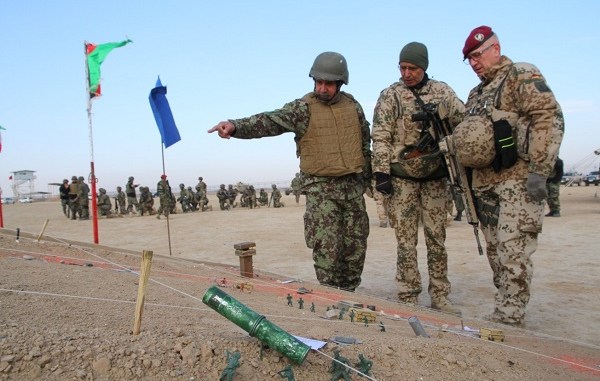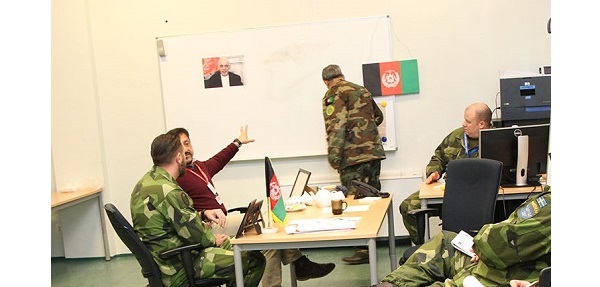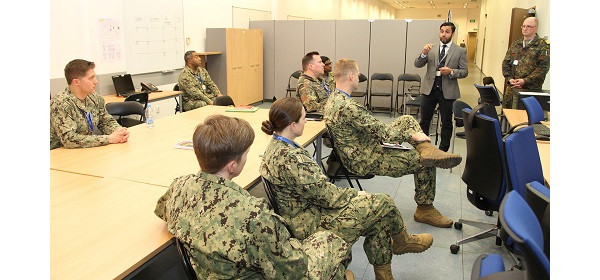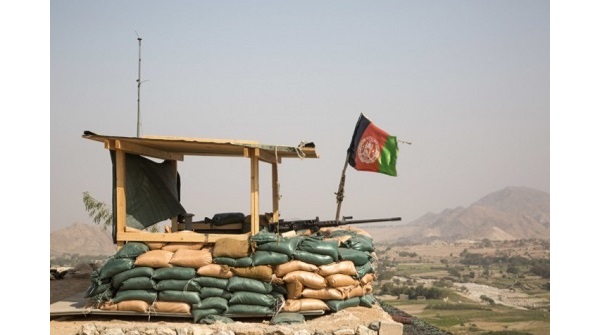
Over the last few decades there have been a number of courses established to prepare advisors and trainers for a deployment to Afghanistan. Some of these courses were extremely good, while others . . . not so much. The Afghanistan pre-deployment training at NATO’s Joint Force Training Centre (JFTC) was one of the better ones. With the withdrawal of U.S. and NATO troops from Afghanistan the premier advisor training course is being discontinued.
JFTC. The Joint Force Training Centre is located not far from the city center of Bydgoszcz, Poland. It is a modern yet modest campus of several buildings housing offices, classrooms, training areas, and a large auditorium. JFTC supports training for NATO and partner forces to improve joint and combined tactical interoperability. JFTC conducts a number of activities to include conferences, seminars, exercise support, and training courses. It has an international flavor with staff from many of the different NATO nations. The common language used is English as is all training materials and in training environments.
Advisor Training Schools. For the first several years of the International Security Assistance Force (ISAF) existence advisors and trainers were deployed on various types of training missions in Afghanistan on an ad hoc basis. Once it was apparent that the U.S. and NATO was committed to supporting the Afghan military over the long-term it was recognized that a professional advising and training effort was required. Over the years a number of schools and courses were established by the U.S. and NATO countries to train their officers and NCOs to be effective advisors and trainers. Many of these courses were established quite a few years after they were needed, but once set up, provided the needed pre-deployment training for advisors and advisor teams heading to Afghanistan.
ISAF and Training the SFAATs. In the 2011 to 2014 timeframe there was a huge push to deploy advisor teams to Afghanistan. The intent was to professionalize the Afghan National Defense and Security Forces (ANDSF) and the Afghan security institutions (ASIs) so that the Afghans could take the lead in combat operations. At the same time the U.S. and NATO were reducing their combat power in Afghanistan. With help from these Security Force Assistance Advisory Teams (SFAATs) the Afghans were slowly taking the lead for combat operations. To prepare the advisors and the advisory teams in this Security Force Assistance mission pre-deployment training was necessary. The United States had several advisor courses – one of the largest was located with the U.S. Army’s Joint Readiness Training Centre (JRTC) at Fort Polk, Louisiana. Another course to prepare trainers and advisors was conducted at the U.S.-run Joint Multinational Readiness Center (JMRC) in Hohenfels, Germany. Many NATO advisor teams attended the excellent JMRC course in preparation for their Afghan tour.

Photo: Attendees listen to a presentation about Afghan security institutions by senior Afghan officials of the MoI and MoD during the academics portion of the Resolute Support Training Event at Joint Forces Training Centre. (photo by JFTC staff)
RS and Advisor Training. As the effort in Afghanistan was reduced the ISAF combat-oriented mission ceased and morphed into the Resolute Support Mission focused on the train, advise, and assist effort. U.S. and NATO manpower significantly declined over time and the number of SFAATs deployed at the Afghan army kandak (battalion) and police district levels diminished. The training at JMRC in Germany for advisor teams was discontinued. The training of NATO officers and NCOs for deployment to Afghanistan was picked up by NATO’s Joint Forces Training Center in Poland in 2014. JFTC had a tough act to follow as the JMRC advisor training course was very professional and produced a quality product. The emphasis at JFTC was less tactics and more staff level as most of the advisor teams were now with the ministries in Kabul or at the brigade, corps, provincial, or police zone level.
RS Training Events. JFTC conducted its pre-deployment training for Afghanistan for several years. The Resolute Support Training Events were usually run for two-weeks, four times a year. The training audience varied from 200 to 500 personnel each training event. The training was geared for three different types of attendees: those who would work on the Resolute Support Mission headquarters staff in Kabul in a non-advisory capacity, those who would be on the RSM staff supporting the Security Force Assistance mission, and those who would be advisors with the ANDSF or ASIs.

Photo: A Swedish advisor team member is learning how to interact with his interpreter and Afghan counterpart during pre-deployment training at the Joint Forces Training Centre. (photo JFTC staff)
Course Content. The first week of the course was on general Afghanistan topics – RS mission structure, security environment, intelligence updates, ANDSF, Afghan security institutions, aspects of the security force assistance mission, culture, politics, religion, top issues and challenges, and other relevant subjects. This week of academics was, for the most part, conducted in an auditorium setting. All three attendee categories underwent this phase of the training. The non-advisory RSM staff attended just the first week and returned to their home countries or continued on their deployment to Afghanistan.
The second week encompassed two different types of training. Those destined to be advisors went to the ‘advisor track’ while those supporting the SFA effort on the RSM staff were on the ‘SFA staff track’. This week of training combined both academics and practical exercise events – usually in a small group environment. A key component of the training was the presentations given by high ranking officials of the Ministry of Interior and Ministry of Defense that provided an Afghan perspective on the Resolute Support Mission. In addition, during this week of advisor training numerous Afghan role players were employed to provide an ‘advisory experience’ to the course attendees. Some of the RS training events incorporated training and a mini-CPX for Train Advise Assist Command (TAAC) staffs – usually from TAAC North or TAAC West.

Photo: One of the small groups learning about their future role on staff at Resolute Support headquarters supporting the Security Force Assistance effort in Afghanistan. (photo by JFTC staff).
In-Country Site Surveys. Over the past several years JFTC continually refined and improved the advisor / SFA training experience. Prior to each advisor course a small cadre of JFTC staff and subject matter experts would travel to Afghanistan to receive briefings at the RSM headquarters in Kabul as well as travel out to the relevant Train, Advise, and Assist Commands (TAACs) for briefings on the ANDSF, current status of SFA, hot topics, and training issues. Upon their return to Bydgoszcz this small site survey group (approximately 10 personnel) would set out to update and refine the training for the upcoming evolution of advisor training. This ‘site survey’ aspect of JFTC’s training certainly elevated the value of the advisor training at Bydgoszcz. The approach to improving the training utilizing the in-country training refinement visits was one that seemed unique among all the other advisor training courses.
In-Country SMEs. One of the strong aspects of the RS training events was the incorporation of subject matter experts (SMEs) from Afghanistan into the training event in Bydgoszcz. Much of the instruction and mentoring was provided by military personnel assigned to RS headquarters as well as those at the TAACs. These SMEs came from advisor teams or were staff members working in one of the ‘functional’ SFA areas. The use of SMEs provided the students with up-to-date information on the various aspects of the security force assistance mission and the train, advise, and assist processes in place. These in-country SMEs were augmented by recently re-deployed military personnel who had completed an Afghan tour in an advisor capacity.

Photo: Members of the JFTC staff and SMEs during a exercise coordination meeting at JFTC during Resolute Support pre-deployment training for Afghanistan. (photo JTFC staff)
NATO Plans for Future Afghan Advising Efforts. Now that the NATO mission in Afghanistan has ended (ISAF and now RSM) there are no troops left to conduct the train, advise, and assist mission. However, according to recent announcements by NATO, the withdrawal of troops does not mean the end of the relationship with Afghanistan. NATO will continue to provide training and financial support to the ANDSF. It will also continue out-of-country training for the Afghan Special Operations Forces; and, perhaps for other ANDSF or ASI organizations as well. Fortunately, there is a large number of NATO officers and NCOs who have worked in Afghanistan as trainers and advisors over the years that can be called upon to continue this ‘over the horizon‘ Afghan training mission. In addition, JFTC has had the good fortune of being assisted by several civilian firms (foremost among them Cadence Consultancy) that provided quality staff, instructors, and trainers to the RS Afghan pre-deployment course and that remain available for future training efforts.
NATO Mission Iraq. With the end of the Resolute Support Mission the Afghanistan advisor course at JFTC has come to an end. However, the mission of providing advisor training to NATO officers and NCOs will certainly continue. NATO has shown that it will remain involved in advisory efforts – of note is the current NATO Mission Iraq or NMI. This is a non-combat mission that aims to strengthen Iraqi security institutions and forces so they are able to degrade and defeat the fighters of the Islamic State. This advisory, training, and capacity-building mission in Iraq was established in 2018 and involves several hundred trainers and advisors, some who will attend the JFTC NATO Mission Iraq Pre-Deployment Training.
Bydgoszcz. The Joint Force Training Centre is located in the picturesque city of Bydgoszcz, Poland. The JFTC campus is a short walk from the city center where there are a number of hotels for the course attendees. During off duty hours there are some aspects of the small city that can be explored and enjoyed – to include the opera, museums, the river walk, and more. In addition, there are a large number of excellent restaurants in the Old Market Square. Bistro Katarynka is a favorite with superb food, excellent service, and a friendly staff.

Photo: An Afghan flag flies over an observation post, Pekha Valley, Achin district, Nagarhar province. (photo by CPL Matthew DeVirgilio, NSOCC-A)
Not Forgetting Advisor Lessons Learned. The Joint Force Training Centre provided quality training for several years for NATO and partner nations forces sending advisors and trainers to Afghanistan. Their unique method of providing up-to-date and relevant instruction by inviting in-country SMEs, utilizing contractor support, and conducting site surveys in Afghanistan is a model for other institutions providing advisor training. There is concern that with the U.S. and NATO shift in focus from counterterrorism and counterinsurgency missions to great power competition the lessons learned in providing trained professionals for advisory assignments will be lost. Hopefully institutions like JFTC will retain that capability for future conflicts.
*********
Top Photo: A German advisor at TAAC North reviews an ANA exercise plan. (Image by Resolute Support Twitter 16 Feb 2018).
The author served in Afghanistan with the U.S. Army Special Forces. Upon retirement from the military he served as a Counterinsurgency Advisor with the COMISAF Advisory and Assistance Team (CAAT) in Afghanistan during the 2012-2014 time frame. His primary focus was Security Force Assistance. During this period he visited, observed, interviewed, and / or embedded with over 100 SFAATs. He also observed advisor team training in the United States, at JMRC, and at JFTC. From 2015 to 2017 he was an adjunct SFA SME for JFTC to include several JFTC site surveys in Afghanistan. He was a contributor to the RS Security Force Assistance Guide.